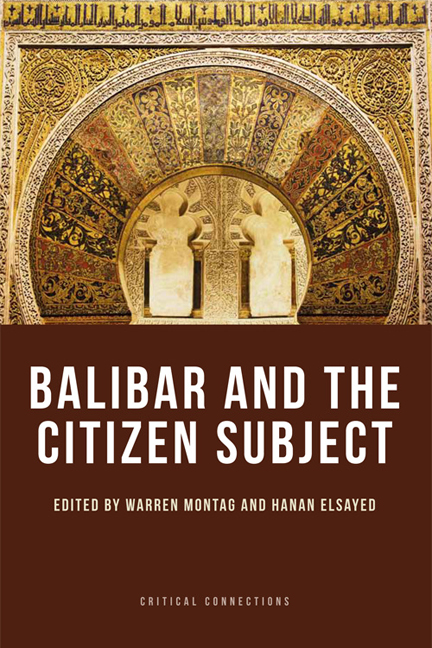Introduction: Balibar and the Citizen Subject
Published online by Cambridge University Press: 10 January 2018
Summary
There are many pathways in contemporary thought that commence, or recommence after appearing to have broken off, in the work of Etienne Balibar. Some of these pathways begin at the point of his collaboration with Louis Althusser, while others only appear after, in certain cases long after, this collaboration had come to an end. It would be a mistake, however, to read Balibar's work in relation to an imaginary “Althusserianism,” whether as its continuation or as a radical break from it. The collective project in which both Althusser and Balibar participated during the 1960s and 1970s was anything but a closed theoretical totality; on the contrary, it was a movement able to persist as a singular, but composite, body of thought only through a process of internal differentiation that impelled it outside of itself in search of what would preserve its existence, exposing it to various aleatory encounters. Althusser once referred to himself, as well as to his so-called disciples, as so many distinct effects of this collective project, itself part of a specific historical conjuncture:
if we are here, it is as the effects of a theoretical conjuncture. The person who is addressing you is, like all the rest of us, merely a particular structural effect of this conjuncture, an effect that, like each and every one of us, has a proper name. The theoretical conjuncture that dominates us has produced an Althusser-effect, as it has produced a Rancière-effect, a Balibar-effect … and so on.
He added “this effect exhibits variations” that “do not coincide.” What Althusser termed the “Balibar-effect,” even in its specificity, cannot be understood as a linear, progressive development that would lead from Reading Capital to Balibar's most recent work, nor as two distinct developments separated by a chronological break that would allow us to speak of a “before” and an “after.” If we can say that Balibar's work is marked by constant innovation that prevents us from understanding it as a continuous development (that would be another way of speaking of the famous theoretical “detours” or deviations that, for Althusser, finally constituted the sole way forward), we must also recognize that it constitutes a line of thought that is compelled to make a detour through its own past.
- Type
- Chapter
- Information
- Balibar and the Citizen Subject , pp. 1 - 34Publisher: Edinburgh University PressPrint publication year: 2017



